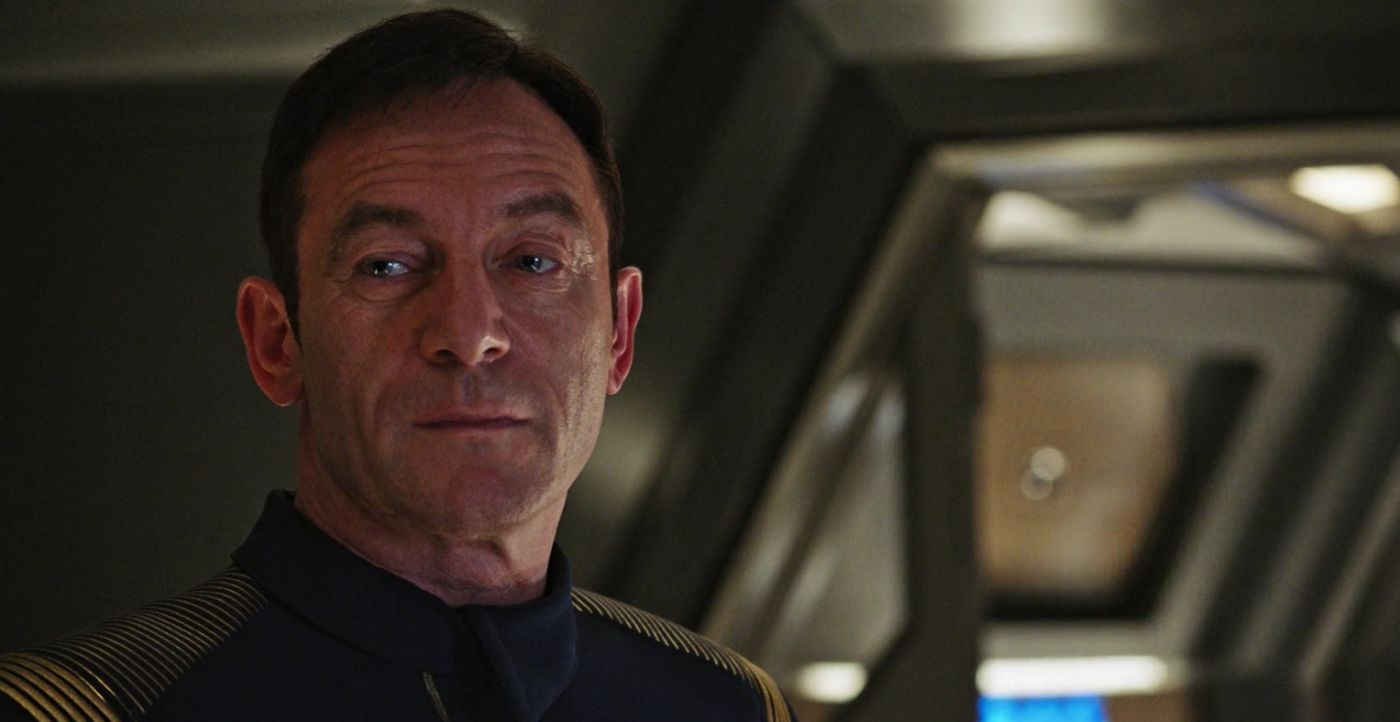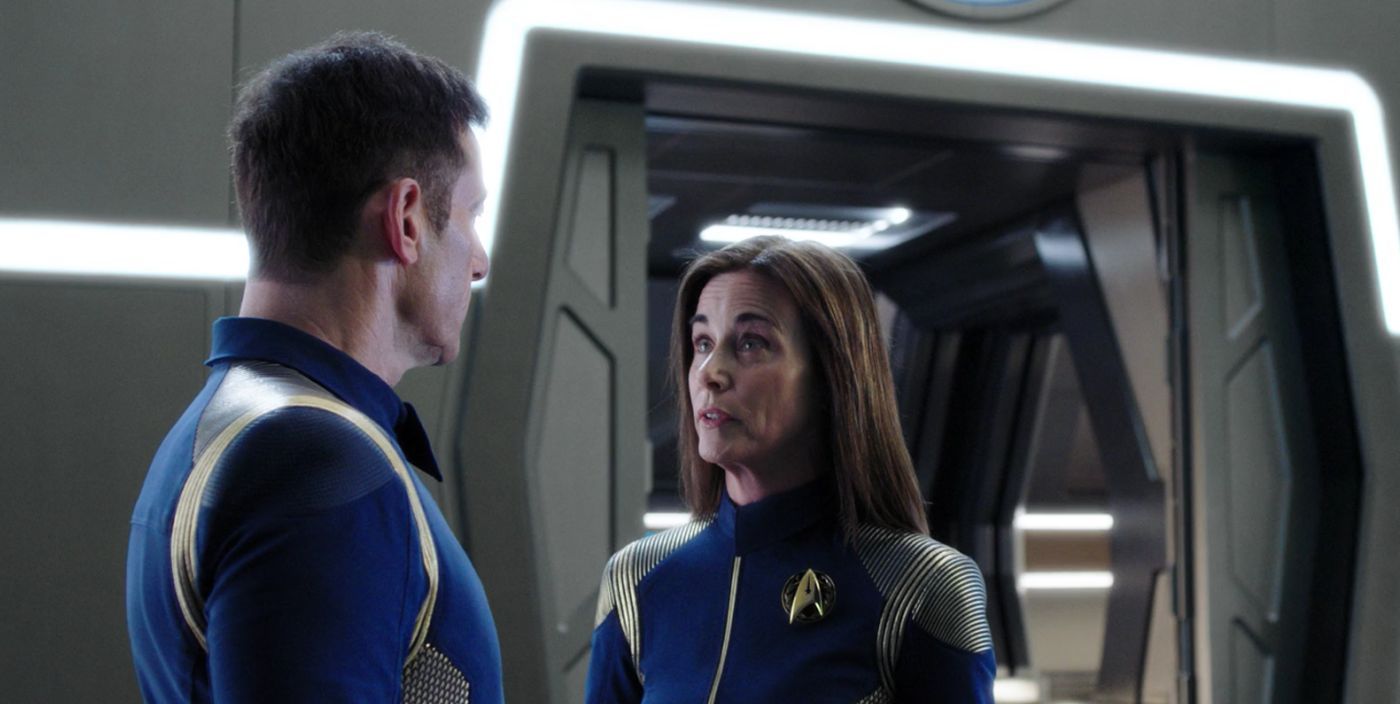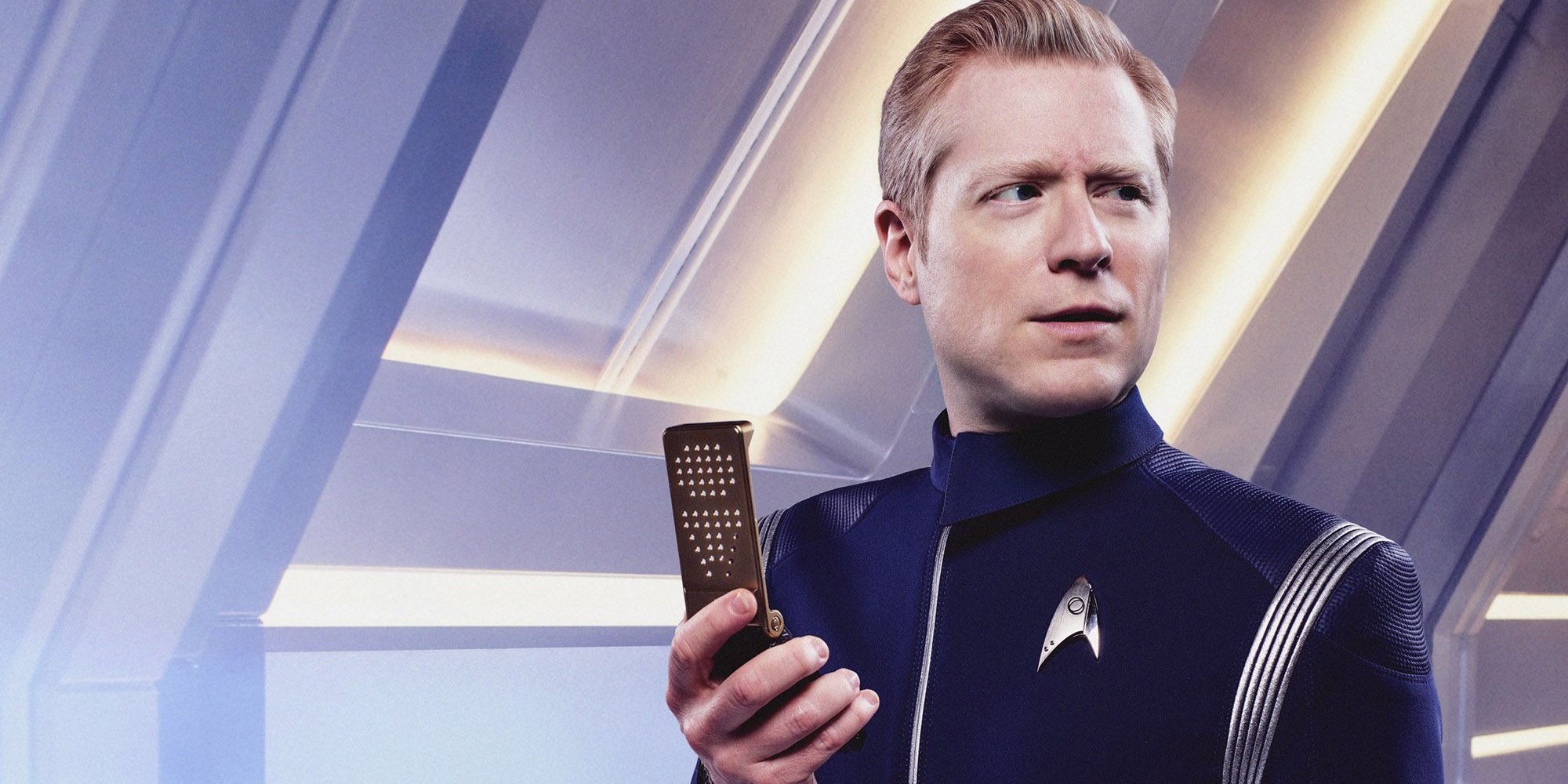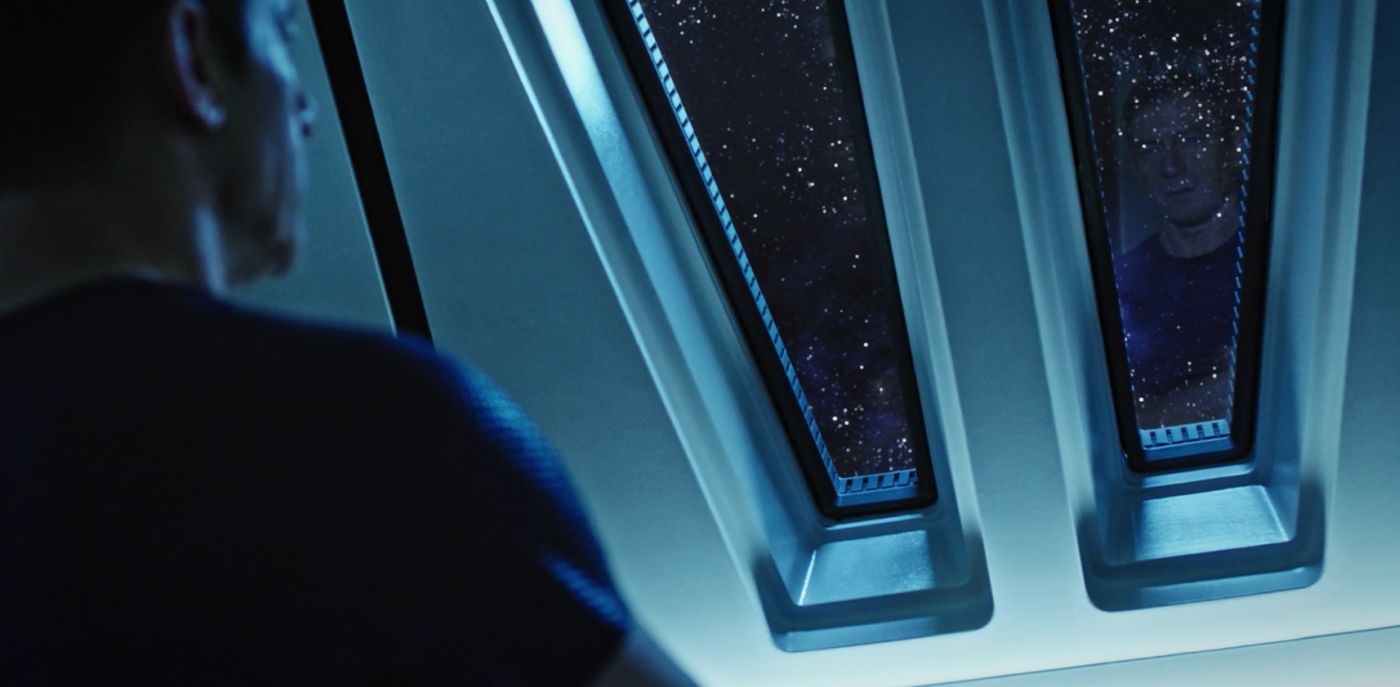Star Trek has had its share of controversy among its starship captains, from James T. Kirk's (William Shatner) penchant for risk-taking and disobeying orders to Benjamin Sisko (Avery Brooks) tricking the Romulans into entering the Dominion War. With 'Lethe', the sixth episode of Star Trek: Discovery, we've entered a new frontier: a captain who is psychologically unfit for command and is discovered by his superior officer, but has grown adept at hiding his condition from his crew and fostering their loyalty. By the last shot of 'Lethe', with Captain Gabriel Lorca (Jason Isaacs) brooding alone in his quarters facing his own reflection in a window, we're unsure what exactly to make of Discovery's commander, but it spells bad tidings for Starfleet and the Federation's war against the Klingons. Just how bad is the question.
More of Captain Lorca's backstory was revealed in the previous episode 'Choose Your Pain' when Lorca was captured and tortured by the Klingons. He has been afflicted by an eye injury since the war began, and we learned his painful sensitivity to light was caused in the incident that led to the destruction of his previous command, the U.S.S. Buran. Lorca destroyed the ship and sacrificed his entire crew rather than have any of them taken prisoner by the Klingons. By doing so, Lorca disregarded the longstanding naval tradition of the captain going down with his ship. Instead, Lorca was the sole survivor of the Buran tragedy, which seems suspicious. Yet his actions were seemingly rewarded with command of the U.S.S. Discovery, the most advanced ship in Starfleet and now their primary weapon against the Klingons.
Related: Star Trek: Discovery Officially Renewed for Season 2
Lorca was also gifted with an unprecedented amount of independence and leeway in his current command. He is allowed to use any means he sees fit to fight the war as well as recruit anyone he sees fit to join his crew. To say his choices have been controversial is an understatement, especially in the case of Michael Burnham (Sonequa Martin-Green), whom he has basically "adopted". Burnham is Starfleet's first mutineer and is credited (for a lack of a better word) with starting the Klingon War. Rather than the life imprisonment she was sentenced to, Burnham is now a Science Specialist and bridge officer on board the Discovery by Lorca's decree. Lorca's decisions have not gone unnoticed; Starfleet Command ordered Discovery to withdraw from the front lines but Lorca disregarded those orders. Neither formal communications nor personal inquiries by Admiral Cornwell (Jayne Brook) have phased Lorca's resolve to keep doing whatever he thinks is best.
What's really going on with Discovery's controversial captain? Let's dive a little deeper.
IS LORCA CRAZY?
The advent of having counselors on board starships to help crew members cope with the myriad rigors of prolonged space travel won't canonically happen until the 24th century in Star Trek, but Captain Lorca is Exhibit A that Discovery desperately needs a ship's counselor. Only seven months into the war, we can already see the emotional damage many Starfleet Officers are suffering from. Traditionally, the Chief Medical Officer serves as an ersatz ship's counselor in this era of Star Trek - in the case of the Enterprise's Dr. Leonard McCoy, his counseling sessions usually involve a bottle of Saurian brandy - and we even see that sort of counseling when Admiral Cornwell visits with Lorca on board Discovery. They're old friends and they have a past sexual relationship. Lorca was quick to involve a bottle of whiskey in their counseling session as Cornwell tried to get to the bottom of 'her friend's' odd and upsetting behavior.
Cornwell's list of charges against Lorca is devastating. She is correct in noting that Lorca returned to the captain's chair like nothing ever happened after being held as a POW by the Klingons. He treats Discovery like it's "his own fiefdom," which Lorca does revel at with his choices, especially when it comes to choosing personnel. That Lorca has so much independent power is Starfleet Command's fault, but Lorca's decisions are questionable at best. Burnham, a mutineer, being back in uniform is just the start of it. His new Chief of Security, Lieutenant Ash Tyler, is a POW who, immediately after escaping seven months in Klingon captivity, is immediately granted a bridge position. Lorca says he checked out Tyler's history and was satisfied, but many fans suspect Tyler is in fact a Klingon incognito. Lorca wasn't on board Discovery when Lieutenant Paul Stamets began eugenics manipulation on himself as a replacement for the Tardigrade's role as navigator in the mycelial spore drive, but he has allowed Stamets to continue, despite the obvious odd behavior and wild change in personality Stamets now exhibits.
Granted, this is Star Trek and strange command decisions happen all the time. In the Kelvin Timeline, Jim Kirk (Chris Pine) rocketed from cadet to Captain of the Enterprise in days because he saved the Earth. Captain Janeway got the U.S.S. Voyager lost in the Delta Quadrant for seven years and violated numerous Starfleet regulations. Upon returning to Earth, she was promoted to Admiral. Questionable promotions aren't anything new to Starfleet, but if we demand a modicum of realism, Lorca's hiring practices should be setting First Officer Saru's (Doug Jones) threat ganglia off left and right. Lorca also fostered an environment where his former Security Chief Commander Landry (Rhekha Sharma) was so unwilling to question Lorca's decisions, she got herself killed attacking the Tardigrade in what has to be the single stupidest act ever by a Star Trek character.
After sleeping together, Lorca suddenly became incensed and pointed a phaser at Cornwell in bed when she noticed the strange scars on his back. So not only does he sleep with a phaser in his bed, the truth came out that Lorca expertly lied in all of his psyche evaluations he claimed he passed with flying colors. Cornwell described Lorca's behavior as pathological and threatened to take Discovery away from him. Cornwell didn't make this decision lightly or out of malice; she even suggested that once he gets the help he needs, he might be able to get command of Discovery back. Soon, Cornwell is immediately taken prisoner by the Klingons. Rather than attempt to rescue his old friend, as Lorca has been prone to do for everyone from Dilithium miners to Ambassador Sarek (James Frain), he decides to defer to Starfleet Command for further orders, knowing they likely won't risk Discovery on a rescue mission - thereby keeping Lorca's command safe from the woman who wanted to take it away.
IS LORCA WHO HE SAYS HE IS?
The impending Mirror Universe episode has cast doubt on the identity of Paul Stamets, and 'Lethe' used the same method of having Lorca stare into a mirror image of himself to infer that Lorca himself is from the Mirror Universe, which is a theory some fans subscribe to. However, there is a major difference between Stamets and Lorca in the mirror. We are clearly shown a creepy moment where Stamets steps away from the mirror but his mirror image remained frozen in place before moving independently. Lorca was shown looking at his seemingly normal reflection, but it didn't move by itself. Rather, the shot moves down to a phaser in Lorca's belt, a symbol perhaps of his eternal paranoia. There's also the fact that Stamets merged with the Mycelial network, which would explain a switch with his mirror duplicate. We have no explanation as yet how Lorca could have been switched with a mirror double, unless we get more info about what happened aboard the Buran, but the Mycelial spore drive didn't exist on the Buran as far as we know.
However, two things Cornwell said fuels speculation that Lorca is a Mirror duplicate. When Cornwell described a past trip they took to see the Perseid meteor shower, Cornwell noted that Lorca didn't seem to remember, which he blew off as just recalling how long ago it was. Later, when Lorca tries to explain himself to Cornwell after pulling the phaser on her, Cornwell replied, "I hate that I can't tell if this is really you." This episode is titled 'Lethe', which refers to the choice Sarek made in his past involving his Michael and Spock (Leonard Nimoy), but 'lethe', which means 'forgetfulness', 'concealment', and 'oblivion' in classical Greek, also refers to Lorca and his actions to keep himself in command of Discovery no matter the cost. It may also infer that Lorca is prone to memory loss, which is a dangerous condition for a starship captain. Cornwell knows Lorca better than anyone we've met thus far, and she uncovered beyond a shadow of a doubt that Lorca is adept at hiding secrets and, in some form or another, is not the man who presents himself to be.
We're meant to feel that Captain Lorca doubts the man he sees in the mirror as much as we do, but we can also judge him from the loyalty he has inspired in his crew and the results he has achieved this far against the Klingons. Unlike the explorer-philosophers we're used to seeing as our Star Trek captains, Lorca is a soldier and a warrior first and foremost, and he is indeed dangerous. Lorca is a man who feels the need to keep a phaser under his pillow, right or wrong. Whether the mistakes Lorca has made will inevitably outweigh the victories he has achieved or are yet to come is a question Star Trek: Discovery will answer as it continues its first season, but we're bound to find out what Gabriel Lorca is truly made of.
NEXT: STAR TREK: DISCOVERY OFFICIALLY RENEWED FOR SEASON 2
Star Trek: Discovery streams Sundays @ 8:30pm ET on CBS All-Access, on Space in Canada, and internationally on Netflix.




